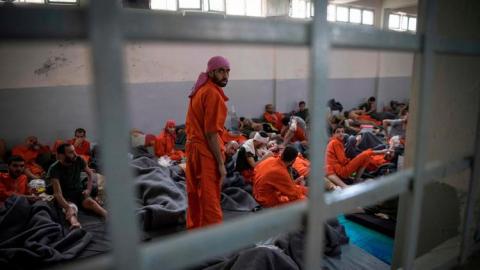Division over Eid al-Fitr declaration for 1st time in Yemen's history


Yemenis on Monday deeply divided about declaring the first day of Eid al-Fitr festival that marks the end of holy month of Ramadan for the first time in the history of the war-torn Arab country.
In the southern port city of Aden, the Saudi-backed Yemeni government declared that Tuesday will be the first day of Eid al-Fitr, while the Houthi rebels, who control the capital Sanaa and other northern provinces of the country, declared that Tuesday is complementary to Ramadan and Wednesday, June 5 will be the first day of Eid al-Fitr.
The Yemeni Ministry of Endowment and Religious Guidance based in Aden said in a statement that "after continuing communication with the official moon-sighting committee based in the country's coast, it has been proven that Tuesday, June 4 will be the first day of Eid al-Fitr festival."
However, the Houthi authorities in Sanaa opposed the Saudi-backed Yemeni government by announcing the start of Eid al-Fitr festival on June 5, a day later.
As a result, the Yemeni people in Sanaa and other northern provinces controlled by the Iranian-backed Houthis will not celebrate Eid al-Fitr on Tuesday, June 4.
But the Yemeni people in Aden and other southern provinces controlled by the Saudi-backed government will follow the Ministry of Endowment and Religious Guidance statement and start celebrating Eid al-Fitr on Tuesday.
This is the first time that Yemenis found themselves divided over celebrating Eid al-Fitr despite years of deadly conflict between Yemen's government and the Houthi rebels.
Local activists said that the Houthis wanted to challenge the Saudi-backed Yemeni government over moonsighting and announce celebrating the festival one day later, indicating that the country's deepening political divisions has started to include religious beliefs.
The neighboring Gulf countries, including Saudi Arabia, Kuwait and the United Arab Emirates (UAE), will bring a close to the holy fasting month of Ramadan and begin celebrating Eid al-Fitr on Tuesday, June 4.
Yemen has been plagued by a civil war since late 2014 after Houthi rebels revolted against the internationally recognized government of President Abd-Rabbu Mansour Hadi.
The rebels advanced from their far northern stronghold of Saada province toward the south, and seized control over much of the country's north including the capital Sanaa, thus triggering the civil war.

Paris — The French humanitarian organization Acted announced that it has delivered cash assistance to nearly 89,000 people affected by displa…

Sana’a — Fuel and food imports into ports under the control of Yemen’s Houthi movement on the Red Sea have continued to fall for…

ADEN — Yemen Airways, the country’s national carrier, announced it will resume flights between Aden and Abu Dhabi beginning in January…